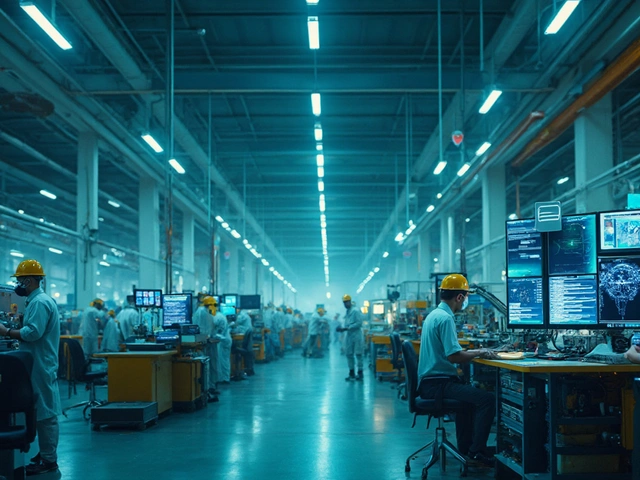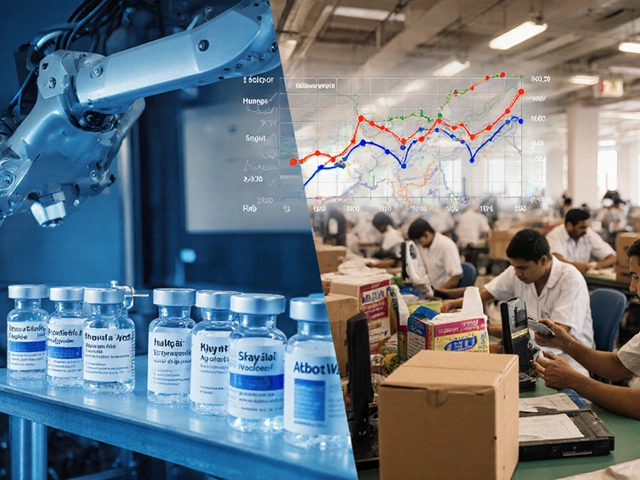
In 2025, the landscape of the manufacturing industry is transforming, driven by what consumers value and businesses innovate. There’s a bounty of potential for those who are ready to dive into the world of creativity and production. This era isn’t just about producing at scale; it’s about understanding the new-age consumer and offering them what they seek, with a unique twist.
For entrepreneurs looking to make their mark, manufacturing offers numerous pathways. From sustainable and eco-friendly products to the tech innovations in healthcare, there’s no shortage of exciting avenues to explore. Dive into sectors where the demand not just meets supply but exceeds expectations. By understanding the shifts in consumer habits and technological advances, businesses can position themselves right at the forefront of profitability.
- Emerging Trends in Manufacturing
- The Sustainability Factor
- Health Tech Manufacturing
- Niche Markets and Opportunities
Emerging Trends in Manufacturing
The manufacturing industry is a living organism, constantly evolving in response to the advancements of technology and shifts in consumer preferences. In 2025, one of the significant emerging trends is the integration of digital technologies, which are redefining manufacturing processes globally. The new age of smart manufacturing uses IoT devices to connect machines and systems, enabling real-time data tracking and predictive maintenance. This transition not only increases efficiency but also reduces operational costs by minimizing downtimes. Companies are embracing Industry 4.0, which focuses heavily on automation powered by artificial intelligence and machine learning algorithms. These technologies empower factories to tailor their production methods swiftly to market demands, offering a competitive edge in the fast-paced industry.
As businesses dive deeper into digital transformations, additive manufacturing or 3D printing has come across as a revolutionary trend. This technology allows for the rapid prototyping and localized production of complex parts with minimal waste. It's particularly beneficial in industries like aerospace and healthcare where customization is critical. Many small to medium-sized enterprises (SMEs) are also investing in 3D printing technologies to cater to specific niche markets. The personalized products not only meet unique customer needs but also yield higher profit margins, a boon for emerging businesses. The freedom to innovate with design and materials is a game-changer, making manufacturing more accessible and scalable for profitable business ideas.
Another transformation seen is in supply chain logistics, where blockchain technology is being introduced to offer transparency and trust. This technology creates secure, immutable records of transactions, ensuring the authenticity and origin of products. Such secure systems reduce the risk of fraud and enhance consumer confidence in the brand. With sustainability being a major concern, blockchain's ability to verify ethical practices is invaluable. The connection between sustainability and manufacturing is a major trend as consumers prefer companies practicing responsible manufacturing. Many brands, from fashion to electronics, are seeking ways to reduce their carbon footprint by using recycled materials and investing in renewable energy sources. These efforts not only cater to the environmentally conscious consumer but also align with regulatory requirements increasingly enforced worldwide.
Manufacturing is also seeing a paradigm shift in production techniques to accommodate consumer demand for faster delivery times. The rise of direct-to-consumer models is encouraging local or onshore manufacturing, drastically cutting shipping times and providing greater control over product quality. This shift necessitates a rethink in traditional manufacturing setups, not just to improve speed but also flexibility and sustainability.
According to a report from Deloitte, "Smart factories can boost productivity by up to 30% and improve labor utilization by as much as 20%." This statistic underscores the potential of adopting cutting-edge technologies to drive efficiency and business growth.The continuous adaptation to the evolving demands ensures that manufacturing remains a vital component in the global economic landscape.

The Sustainability Factor
The drive towards a sustainable future is no longer just an idealistic vision, but it is quickly becoming the cornerstone of many successful manufacturing business ventures. Environmental awareness is touching every corner of the globe, thanks to heightened consumer expectations and the increasing impact of climate change. Many companies are now finding innovative ways to make a difference while also seeing substantial growth in their profits. This transformation is not simply about producing green products; it's about integrating sustainability into the core manufacturing processes to create a more balanced approach to business.
One of the most impactful strategies is the adoption of a circular economy model, which emphasizes reduction, reuse, and recycling of materials. This model allows companies to minimize waste and emissions while maximizing resources, offering both a profitable business framework and a positive environmental impact. Electric vehicle (EV) manufacturing is a sterling example of this approach, as the shift towards EVs is not just reducing exhaust emissions but is also prompting a substantial recycling industry for battery materials. According to a report by BloombergNEF, it's projected that by 2030, the energy storage sector will boomed into a $546 billion industry, driven primarily by the demand for recycled battery materials.
"Businesses that embed sustainability into their operations are setting themselves up to outlast and outperform their peers, while contributing positively to the world," says Paul Polman, former CEO of Unilever.
Industries producing biodegradable packaging are also witnessing significant growth. With policies increasingly aligning with eco-friendly initiatives and consumers leaning towards environmentally-conscious brands, investing in biodegradable materials is increasingly appealing for manufacturers. Recognizing these needs, companies are harnessing new materials like mushroom-based packaging and seaweed bioplastics, which are not only sustainable but are also scalable and effective in reducing carbon footprints. This growing demand is underscored by Euromonitor International's report, which estimates that by 2025, sustainable packaging will represent 40% of all global packaging sales, reflecting the significant shifts within the industry.
Sustainability extends also to the energy resources fueling these manufacturing processes. A decisive step towards this is the integration of renewable energy solutions such as solar and wind power. Manufacturing plants adopting such green energy solutions experience reduced operational costs in addition to lessening their carbon emissions. The success of Tesla's Gigafactory, which operates with comprehensive solar and wind installations, underscores the viability and effectiveness of these strategies, positioning them as not just an environmental choice but a smart business move. Moreover, government incentives for using renewable energy sources make this transition even more inviting.
The rise of sustainability in the manufacturing realm represents a confluence of ethical responsibility and profitability. More than just a trend, it is becoming an essential component of modern business practices, catalyzing both growth and innovation. Entrepreneurs willing to embrace these principles are poised to lead in the new decade, as consumers increasingly tie their purchasing power to companies prioritizing their environmental footprint. Observing the trajectory of these sustainable efforts, it is evident that businesses that choose to act today, with the planet in mind, position themselves as leaders in the money-making industries of the future.

Health Tech Manufacturing
The healthcare industry is undergoing a fascinating transformation, largely spearheaded by the advent of new technologies. Health tech, a marriage of technology and healthcare, is paving the way for advanced manufacturing opportunities that promise substantial profits. From wearable technology to advanced diagnostic machines, manufacturers have a vast playground to explore. The demand for health tech is seeing an exponential rise, driven by an aging population coupled with a global shift towards preventive healthcare. Manufacturing businesses focusing on health tech can capitalize on creating innovative products designed to improve life quality and health outcomes.
The surge in remote patient monitoring devices is testament to this burgeoning field. Products like smartwatches and activity trackers are no longer solely fashionable accessories but essential diagnostic tools. They monitor heart rate, oxygen levels, and even detect anomalies that can be lifesaving. A report by the International Data Corporation (IDC) estimated a growth in the wearable tech market to about $105 billion by 2023. This not only reflects a consumer interest but also emphasizes the critical demand for these tech-driven products. As manufacturers, focusing on creating robust, accurate, and reliable health tech products can place your business at a significant strategic advantage. Dr. Jen Lee of the American Health Tech Association states,
“The intersection of healthcare and technology is where the future of personal health management lies. By innovating in this field, manufacturers can remarkably influence both market trends and patient outcomes.”.
Beyond consumer-oriented gadgets, there is also substantial potential in developing industrial and hospital-grade equipment. Manufacturing high-precision tools such as MRI machines, portable ultrasound devices, and automated medication dispensers requires sophisticated knowledge and resources. Yet, the investment yields high returns owing to their necessity in modern healthcare. These tools, essential in diagnosing and treating patients, abide by stringent safety and efficacy standards, making them lucrative for those who manage to break into the field successfully. The specialized knowledge required presents a barrier to entry but also secures profitability once penetrated.
Innovation and Emerging Opportunities
Innovation sits at the core of health tech manufacturing. With significant advancements in areas like artificial intelligence and machine learning, there are myriad possibilities for producers. Automated health assistants, personalized health predictions, and AI-driven diagnostic equipment are inching closer to reality. They draw increased attention from both the healthcare sector and tech enthusiasts. Manufacturing enterprises that can adeptly combine software advances with cutting-edge hardware will lead the pack. A thorough understanding of electronics, software, and clinical needs is crucial to making headway in this field. Success here lies not only in technical precision but in anticipating health trends and demands.
Another avenue in health tech that manufacturers are tapping into is telemedicine. With a growing number of healthcare consultations being conducted online, there’s an immense need for infrastructure to support this. From video conferencing hardware to diagnostic tools that can be used remotely, the scope for innovation is plentiful and diverse. The wave of digital health solutions opens ample manufacturing niches, guaranteeing not just immediate profits but sustained growth over the years as our reliance on remote healthcare solutions strengthens.

Niche Markets and Opportunities
As we advance into 2025, one of the riveting aspects of the manufacturing world is the emergence of niche markets. These markets, often overshadowed by mainstream industries, provide a perfect breeding ground for profitable business ideas. In recent years, a significant portion of entrepreneurs have embraced the concept of carving out unique spaces that cater to specific, yet currently underserved, consumer needs. It's an exciting domain filled with untapped potential and new-age demands that challenge traditional practices.
Consider the market for personalized health products. This segment alone is bustling with opportunities as consumers are becoming increasingly health-conscious. From unique dietary supplements to customized fitness equipment, the appeal is in offering a product that resonates personally with an individual’s lifestyle. Companies like Habit, which provides personalized nutrition recommendations based on DNA analysis, showcase the profound depth achievable in niche markets. Such businesses thrive because they address a specific need, and create tailored experiences that generate lasting customer loyalty.
"In a world full of noise, niche markets allow businesses to communicate directly with their target audience, creating unparalleled relations," said Mark Cuban, renowned entrepreneur and investor.
Let's explore the rapid expansion of home automation solutions. With technological advancements, people are not just interested in smart solutions but also bespoke systems that integrate seamlessly into their living spaces. Entrepreneurs are paving the way with DIY smart home kits tailored to specific home setups or preferences. A noteworthy eye-catcher is the inclusion of eco-friendly automation solutions like solar-powered garden lighting or energy-efficient intelligent thermostats. These products not only appeal to tech enthusiasts but also to the environmentally conscious consumer, hitting two birds with one stone.
The rise of specialized vegan and allergy-free consumer goods is another brilliant example of the power of niche markets. With more people becoming aware of their diets and potential allergens, there's a growing demand for foods that cater to alternative dietary choices. The manufacturing industry is ripe for ventures focusing on producing unique snacks, baked goods, and even cosmetics that are free from common allergens such as nuts, gluten, and dairy. The focus on such specifics helps budding companies not just find, but also retain, a dedicated audience, ensuring a profitable and sustainable business model.
As data increasingly drives consumer behavior, the craft beer industry has shown remarkable adaptability in capturing niche markets. By leveraging local ingredients and unique brewing methods, many small breweries have carved identities around unique flavors and sustainable practices. Recent statistics reveal a noticeable increase in the number of craft breweries launched between 2020 and 2024, validating not only the growth of this sector but also the viability of investing in niche-focused operations. Here's a glance:
| Year | New Craft Breweries |
|---|---|
| 2020 | 620 |
| 2021 | 750 |
| 2022 | 860 |
| 2023 | 980 |
| 2024 | 1050 |




